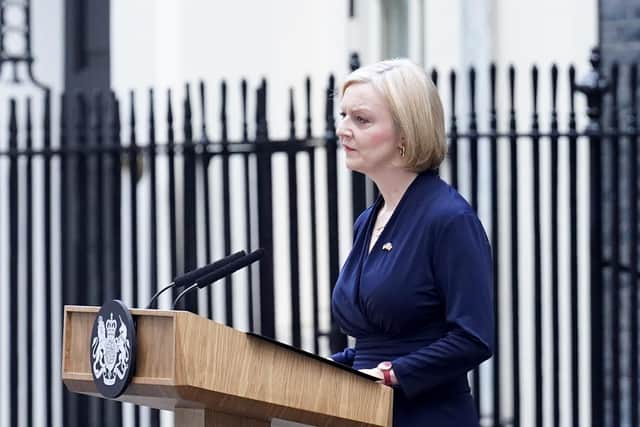Liz Truss resignation: Unlikely General Election will be called, expert says
Professor Kevin Theakston of the University of Leeds specialises in the history of Prime Ministers and the British constitution.
He said the only comparison that can be made between Liz Truss and other short-serving Prime Ministers dates back some 200 years to the 1820s.
Advertisement
Hide AdAdvertisement
Hide AdProf Theakston said: “The next shortest tenure after Liz Truss was George Canning in 1827 - he was Prime Minister for 190 days and died in office. He gave way to Lord Goderich who lasted 144 days and ended up resigning.


“It was a very turbulent time like today, with splits over economy policy and divided cabinets.
“What’s happened is testimony to deep divisions within the Conservative party and the extreme policy Liz Truss pursued.
“Most PMs have a lot of political experience before getting the top job. She showed political immaturity and was out of her depth.”
Advertisement
Hide AdAdvertisement
Hide AdThere have been other years where there have been three Prime Ministers in one calendar year, Professor Theakston said, 1852 and 1868.
Ms Truss’s resignation, which came after a string of disastrous policy announcements and cabinet sackings, has prompted opposition parties to call for an immediate General Election.
But Prof Theakston explained that the only mechanisms outside of the Prime Minister calling an election were unlikely to take place.
“There would need to be a vote of confidence called in the Government,” he said, “or a major Government policy like the Budget being defeated. The last time that happened was in 1979, when Jim Callaghan lost by one vote.
Advertisement
Hide AdAdvertisement
Hide Ad“Tories would be voting for their own defeat, you’d need 30 or 40 to defect to Labour or the Lib Dems and that would take something extraordinary.
“But - we have seen unusual things in the last few weeks.”
The other person who could - technically - dissolve Parliament is the King.
But according to Prof Theakston, the chances of that happening are slim to nil.
“The time the monarch insisted on a General Election was the 1830s,” he said. “It would be inconceivable now and it would provoke a constitutional crisis.
“He is there to advise, encourage and consult, it’s for the Prime Minister to act on the advice.
“There is no way King Charles would weigh into this situation.”